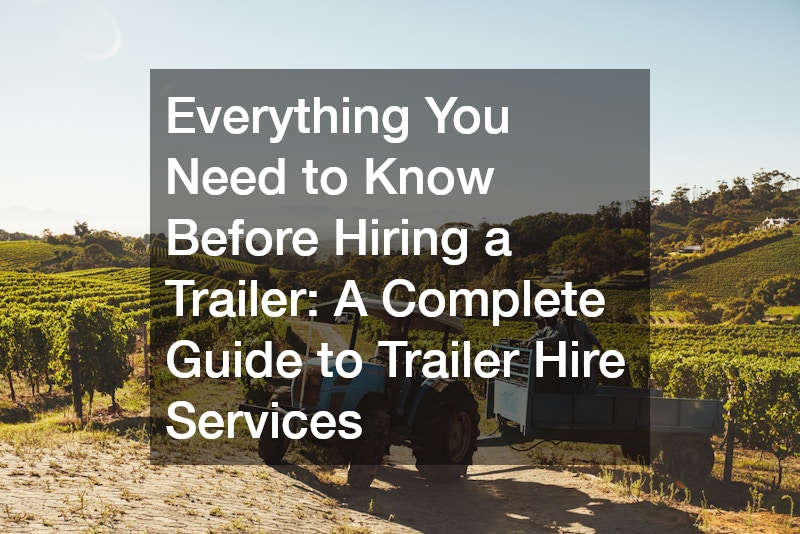Understanding the Basics of Trailer Hire
Hiring a trailer may seem straightforward, but a lack of preparation can lead to delays, additional costs or even safety concerns. Whether moving house, transporting goods or tackling a landscaping project, choosing the right trailer is vital. Before selecting a trailer hire service , it is important to understand what type of trailer suits your needs, what your vehicle can legally tow and what responsibilities you take on when hiring.
Trailers come in many varieties: box trailers, cage trailers, car carriers, enclosed trailers and tipper trailers, to name just a few. Each trailer is designed for a specific purpose and selecting the wrong type could result in inefficiency or damage to your load.
For example, moving bulky garden waste requires a cage trailer, while transporting a vehicle safely requires a car carrier with appropriate tie-down points.
Choosing the Right Trailer for Your Needs
Selecting the appropriate trailer depends on your load, destination and towing vehicle. Overloading a trailer or towing a trailer your vehicle cannot support, is not only dangerous but also illegal under Australian road laws. Vehicle manufacturers provide a maximum towing capacity that must not be exceeded under any circumstances. Exceeding that capacity can result in fines, insurance claims being denied and serious risk to others on the road.
Understanding your load’s weight and dimensions is the first step. A light-duty box trailer may suffice for household waste, but heavier items like furniture or appliances often need a more robust option. If transporting loose materials, enclosed trailers help protect your goods from the elements, while tippers offer convenient unloading for landscaping supplies.
The trailer’s braking system is another crucial consideration. In Australia, trailers with a gross trailer mass (GTM) over 750 kg must have brakes. Trailers exceeding 2,000 kg GTM typically require electric brakes and a compatible brake controller fitted to your vehicle. Ask your hire service provider whether the trailer is braked and whether your vehicle is suited for towing it safely.
Licensing, Insurance and Road Safety
In most states and territories, a standard car licence (Class C) allows you to tow a trailer up to 4.5 tonnes gross vehicle mass (GVM). However, the legal limit is often not what your vehicle can handle, so check the manufacturer’s specifications and any relevant local regulations.
Insurance is another factor to keep in mind. Most hire companies provide basic coverage with the hire fee, but this usually includes a high excess. Before driving away, ask about additional cover options and what the insurance includes. Some policies exclude cover for specific conditions, such as off-road use or may not include your vehicle if it sustains damage during the tow.
All trailers must be roadworthy and registered and while this is typically the hire company’s responsibility, it’s wise to inspect the trailer yourself. Check the tyres for wear, confirm the lights are working and ensure all safety chains and latches are functioning properly.
Responsibilities and Best Practices for Trailer Use
Hiring a trailer comes with a set of responsibilities that extend beyond just picking it up and returning it on time. Safe towing requires proper load distribution, careful manoeuvring and constant attention to braking distances and speed. Trailers significantly affect your vehicle’s handling, especially when turning or reversing.
Load the heaviest items over the axle and secure everything tightly to prevent movement during transit. Unsecured loads can cause instability, increase wear on the trailer and towing vehicle and in severe cases, lead to road accidents. Make sure any straps or tie-downs are rated for the weight being restrained and never overload the trailer or exceed the recommended drawbar load.
Driving with a trailer also means taking corners wider, allowing extra braking distance and reducing speed, particularly on steep inclines or in wet conditions. Inexperienced drivers should consider practising in an empty car park or quiet street before heading onto busy roads.
Returning the trailer in clean, undamaged condition is also your responsibility. Leaving mud, rubbish or damage behind can result in additional cleaning or repair fees. A reliable trailer service will provide clear terms upfront, so be sure to review the contract and ask for clarification before signing.
Finding a Reliable Trailer Hire Service
The quality of your trailer hire experience depends heavily on the provider you choose. Look for a local business with transparent pricing, a modern and well-maintained fleet and positive customer reviews. A good trailer hire company will explain your obligations clearly, help you select the right trailer for your job and provide instructions for safe towing.
Ensure the business offers roadside assistance or emergency support in case something goes wrong while you’re on the road. If you’re hiring for multiple days, check whether overnight storage is allowed and whether trailers can be dropped off after hours.
Pricing varies depending on the type of trailer, duration of hire and location. Some companies offer hourly rates, while others have daily or weekend hire packages. If you expect delays or changes in schedule, discuss flexibility with the provider in advance to avoid late return penalties.



